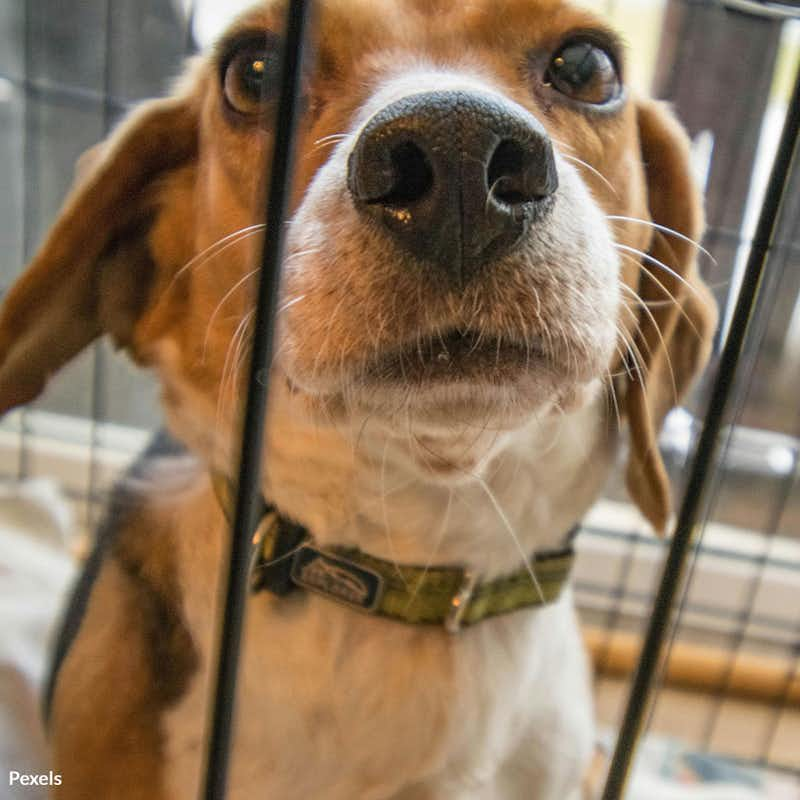Take a Stand Against Cruel Nicotine Tests on Animals
11,943 signatures toward our 30,000 Goal
Sponsor: The Animal Rescue Site
Join us in ending the brutal and unnecessary nicotine tests on innocent animals.

The cruel and unnecessary practice of testing nicotine products on animals must end.
Every year, thousands of animals, including mice, rats, and dogs, suffer inhumane treatment in these tests. They are forced to inhale nicotine vapors or have nicotine-containing substances applied to their skin, leading to severe suffering, significant health deterioration, and often, death1.
The Plight of Animals in Nicotine Testing
Animals used in nicotine testing endure harsh and restrictive conditions. They are confined to small spaces, unable to escape the continuous exposure to harmful substances.
These animals are subjected to procedures that cause immense pain and distress. For instance, rats are often coated with cigarette tar and forced to inhale smoke, leading to skin cancer and horrifying effects such as their skin peeling off1.
After enduring weeks or months of these cruel tests, the animals are typically euthanized so their tissues can be analyzed. The suffering inflicted on these animals raises significant ethical concerns, especially when the benefits of the research are minimal at best2.
Scientific Inaccuracies and Misleading Results
The tobacco industry has a long history of using animal testing to create doubt about the dangers of smoking. These studies often fail to show a clear link between smoking and lung cancer because the physiology of animals like rodents is significantly different from humans. Rodents, for instance, are obligatory nose-breathers, and their lung structure is not a perfect model for human lungs. This results in misleading data that does not accurately reflect the risks of smoking for humans3.
Moreover, the use of "light" or "low tar" cigarettes was promoted using faulty animal studies. Smoking machines used in these tests inhaled a consistent amount of smoke, unlike human smokers who adjust their inhalation to maintain nicotine intake. This led to the false perception that these cigarettes were safer, causing many smokers to switch to these products without any real health benefits1.
A Call for Human-Relevant Research Methods
There are advanced, non-animal testing methods available that provide more accurate and humane alternatives. Lung-on-a-chip models and 3D human tissue cultures can replicate human responses to nicotine exposure more effectively than animal models, which often fail to predict human outcomes accurately2.
Animal rights organizations and some legislators are pushing for a ban on nicotine testing on animals. The European Union's Directive 2010/63/EU encourages the use of alternative methods and aims to reduce the number of animals used in scientific research4. Despite these efforts, some countries continue to allow nicotine testing on animals under certain conditions, highlighting the need for stronger regulations and enforcement.
Take Action Now
We need your help to end the suffering of countless animals and ensure that scientific research is both ethical and effective. By supporting and mandating the use of human-relevant research methods, we can stop these inhumane practices.
Sign the petition to urge the Animal and Plant Health Inspection Service (APHIS) of the U.S. Department of Agriculture (USDA) to mandate the exclusive use of human-relevant research methods for testing the effects of e-cigarettes. Together, we can ensure a better future for all, where scientific progress is achieved without compromising ethical standards or animal welfare.
- Tobacco Free Life, "The Tobacco Industry’s Bad Science and Unethical Testing."
- Animal Defenders International (21 November 2019), "Help stop misleading e-cigarette tests on animals."
- International Agency for Research on Cancer, IARC Monographs on the Evaluation of Carcinogenic Risks to Humans, No. 83, (2004), "Tobacco Smoke and Involuntary Smoking.."
- European Parliament (22 September 2010), "Directive 2010/63/EU Of The European Parliament And Of The Council."
The Petition:
To the Animal and Plant Health Inspection Service (APHIS) and the U.S. Department of Agriculture,
We, the undersigned, call upon the Animal and Plant Health Inspection Service (APHIS) of the U.S. Department of Agriculture (USDA) to mandate the exclusive use of human-relevant research methods for testing the effects of e-cigarettes.
Currently, animals such as mice, rats, and dogs are subjected to cruel and inhumane testing procedures. These animals are forced to inhale nicotine vapors or have nicotine-containing substances applied to their skin, resulting in severe suffering, significant health deterioration, and often, death. They are kept in restrictive conditions, exposed to harmful substances for extended periods, and are ultimately euthanized for tissue analysis.
Despite the ethical concerns, these tests produce unreliable results. The physiology of these animals differs significantly from humans, leading to misleading data that does not accurately reflect the effects of nicotine on human health. Studies have shown that alternative methods, such as lung-on-a-chip models and 3D human tissue cultures, provide more accurate and humane means of testing. These methods replicate human responses to nicotine exposure far more effectively than animal models, ensuring that research findings are relevant and beneficial.
By supporting and mandating the use of human-relevant research methods, APHIS will take a significant step towards ending the suffering of countless animals and ensuring that scientific research is both ethical and effective. This transition will not only improve the welfare of animals but also enhance the accuracy of scientific findings, ultimately contributing to a healthier and more informed society.
We urge APHIS to act now to promote and enforce the use of advanced, non-animal testing methods for e-cigarettes. Together, we can ensure a better future for all, where scientific progress is achieved without compromising ethical standards or animal welfare.
Sincerely,